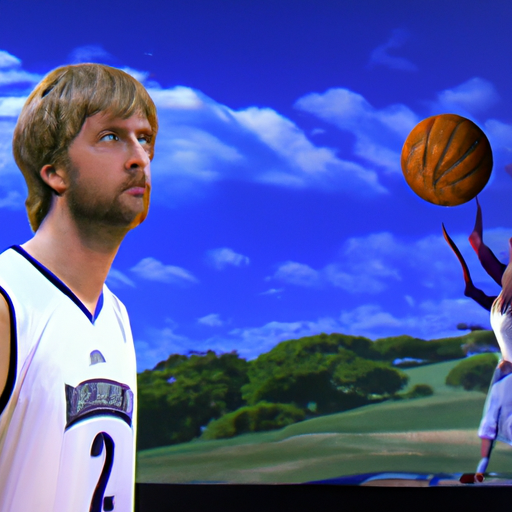Dirk Nowitzki on 2007 playoff loss: “Didn’t want to leave the house for a couple weeks”

Impact of Dirk Nowitzki’s 2007 playoff loss on his mental state
Dirk Nowitzki, the legendary German basketball player, is widely regarded as one of the greatest power forwards in NBA history. Throughout his illustrious career, Nowitzki has achieved numerous accolades, including an NBA championship in 2011 and being named the NBA Finals MVP. However, there is one particular playoff loss that had a profound impact on his mental state – the 2007 playoff defeat.
In the 2006-2007 NBA season, Nowitzki led the Dallas Mavericks to an impressive 67-15 regular-season record, earning them the top seed in the Western Conference. The Mavericks were considered the favorites to win the NBA championship, with Nowitzki being the driving force behind their success. However, their playoff journey took an unexpected turn in the first round.
Facing the eighth-seeded Golden State Warriors, the Mavericks were shocked by their opponents’ relentless energy and tenacity. The Warriors, led by the dynamic duo of Baron Davis and Stephen Jackson, played with an intensity that caught the Mavericks off guard. Despite Nowitzki’s valiant efforts, averaging 27.7 points and 11.7 rebounds per game in the series, the Mavericks were defeated in six games.
The loss devastated Nowitzki, who had poured his heart and soul into the season. In an interview following the defeat, he admitted, “I didn’t want to leave the house for a couple of weeks.” The defeat had a profound impact on his mental well-being, leaving him feeling dejected and questioning his abilities as a player.
Nowitzki’s mental state was further compounded by the criticism he faced from fans and media alike. Many questioned his ability to perform in high-pressure situations and labeled him as a player who couldn’t win when it mattered most. These criticisms weighed heavily on Nowitzki’s mind, fueling his determination to prove his doubters wrong.
However, instead of allowing the defeat to define him, Nowitzki used it as motivation to improve and elevate his game. He dedicated himself to becoming a more well-rounded player, working tirelessly on his weaknesses and refining his skills. Nowitzki’s relentless work ethic and unwavering determination paid off in the subsequent seasons.
In 2011, Nowitzki and the Mavericks found themselves back in the NBA Finals, facing the star-studded Miami Heat led by LeBron James, Dwyane Wade, and Chris Bosh. This time, Nowitzki refused to let history repeat itself. He displayed incredible resilience and mental fortitude, leading the Mavericks to a hard-fought victory in six games. Nowitzki’s performance in the Finals was nothing short of extraordinary, averaging 26 points and 9.7 rebounds per game and earning himself the NBA Finals MVP award.
The 2007 playoff loss undoubtedly had a lasting impact on Nowitzki’s mental state. It served as a turning point in his career, propelling him to become an even greater player. Nowitzki’s ability to overcome adversity and channel his disappointment into motivation is a testament to his mental strength and unwavering determination. His journey from the depths of despair to the pinnacle of success serves as an inspiration to athletes and fans alike, reminding us that setbacks can be the catalyst for greatness.
Analysis of Dirk Nowitzki’s performance during the 2007 playoff loss

Dirk Nowitzki, the legendary German basketball player, recently opened up about the devastating playoff loss his team, the Dallas Mavericks, suffered in 2007. In an interview, Nowitzki revealed that the defeat was so crushing that he didn’t want to leave his house for a couple of weeks. This admission sheds light on the emotional toll that such a defeat can have on even the most accomplished athletes.
Nowitzki’s performance during the 2007 playoffs was nothing short of exceptional. He led the Mavericks to an impressive 67-win regular season, earning himself the Most Valuable Player (MVP) award. With his incredible scoring ability and versatility on the court, Nowitzki was a force to be reckoned with. However, despite his outstanding individual performance, the Mavericks fell short in the playoffs, losing to the eighth-seeded Golden State Warriors in the first round.
The loss was a shock to the basketball world, as the Mavericks were heavily favored to advance deep into the playoffs. Nowitzki, who had been the driving force behind the team’s success, shouldered much of the blame for the defeat. Critics argued that he had failed to deliver when it mattered most, questioning his ability to perform under pressure.
However, a closer analysis of Nowitzki’s performance during that series reveals a different story. He averaged an impressive 26.6 points per game, along with 11.7 rebounds. These numbers are a testament to his individual brilliance and his ability to consistently produce at a high level. Nowitzki’s shooting percentages were also commendable, with a field goal percentage of 47.6% and a three-point percentage of 40.9%.
Despite his stellar statistics, Nowitzki’s efforts were not enough to overcome the determined Warriors. The loss was a collective failure, as the Mavericks struggled to contain Golden State’s fast-paced and high-scoring style of play. The Warriors’ unorthodox small-ball lineup posed significant challenges for the Mavericks’ defense, and their relentless energy proved to be the difference-maker in the series.
Nowitzki’s admission that he didn’t want to leave his house for a couple of weeks after the defeat speaks volumes about the emotional toll it took on him. It is a reminder that even the most accomplished athletes are not immune to the psychological impact of a devastating loss. The weight of expectations, coupled with the disappointment of falling short, can be overwhelming.
However, Nowitzki’s response to the defeat is a testament to his resilience and determination. Rather than allowing the loss to define him, he used it as motivation to improve and bounce back stronger. In the following seasons, Nowitzki continued to elevate his game, leading the Mavericks to the NBA Finals in 2011 and ultimately capturing the championship.
In conclusion, Dirk Nowitzki’s performance during the 2007 playoff loss was exceptional, despite the ultimate defeat. His statistics and individual brilliance cannot be overlooked, and it is unfair to solely blame him for the team’s failure. Nowitzki’s admission of the emotional toll the loss took on him serves as a reminder of the human side of sports and the challenges athletes face in dealing with defeat. Ultimately, Nowitzki’s response to the loss exemplifies his resilience and determination, solidifying his status as one of the greatest players in NBA history.
Reflection on the long-term effects of the 2007 playoff loss on Dirk Nowitzki’s career
Dirk Nowitzki, the legendary German basketball player, recently opened up about the devastating impact the 2007 playoff loss had on his career. In an interview, Nowitzki revealed that the defeat was so crushing that he didn’t want to leave his house for a couple of weeks. This revelation sheds light on the long-term effects that a single loss can have on an athlete’s mental and emotional well-being.
The 2007 playoff loss was a significant blow to Nowitzki and the Dallas Mavericks. After a remarkable regular season, where Nowitzki led the team to a franchise-record 67 wins, the Mavericks were considered strong contenders for the NBA championship. However, they faced a formidable opponent in the Golden State Warriors, who were the eighth seed in the Western Conference.
The Warriors, led by their dynamic backcourt duo of Baron Davis and Monta Ellis, stunned the basketball world by defeating the Mavericks in six games. It was a shocking upset that shattered the Mavericks’ championship dreams and left Nowitzki and his teammates in a state of disbelief.
Nowitzki’s personal performance during the series was also underwhelming. He struggled to find his rhythm and failed to deliver the dominant performances he was known for. This added to his frustration and disappointment, as he felt responsible for the team’s failure.
The aftermath of the loss was a dark period for Nowitzki. He admitted that he was devastated and couldn’t bring himself to face the outside world. The weight of the defeat consumed him, and he found solace in isolating himself from the public eye. This withdrawal from social interactions was a coping mechanism for Nowitzki, allowing him to process his emotions and come to terms with the loss.
However, the effects of the 2007 playoff loss extended far beyond those initial weeks of seclusion. Nowitzki’s confidence took a significant hit, and he struggled to regain his form in the following seasons. The once-dominant player seemed to have lost his edge, and critics questioned whether he would ever be able to reach the same level of greatness again.
But Nowitzki’s resilience and determination eventually prevailed. He used the pain of that defeat as fuel to motivate himself to work harder and improve his game. Slowly but surely, he regained his confidence and began to showcase his exceptional skills once again.
In 2011, Nowitzki and the Mavericks finally achieved redemption. They made it to the NBA Finals and faced the star-studded Miami Heat, led by LeBron James, Dwyane Wade, and Chris Bosh. Against all odds, Nowitzki and his team emerged victorious, winning the championship and solidifying Nowitzki’s legacy as one of the greatest power forwards in NBA history.
Looking back on that fateful 2007 playoff loss, Nowitzki acknowledges the profound impact it had on his career. It was a turning point that forced him to confront his weaknesses and push himself to new heights. The defeat taught him valuable lessons about resilience, perseverance, and the importance of mental fortitude in the face of adversity.
Nowitzki’s story serves as a reminder that even the most accomplished athletes face setbacks and disappointments. It is how they respond to those challenges that truly defines their greatness. Nowitzki’s journey from the depths of despair to the pinnacle of success is a testament to his unwavering determination and serves as an inspiration to athletes around the world.

